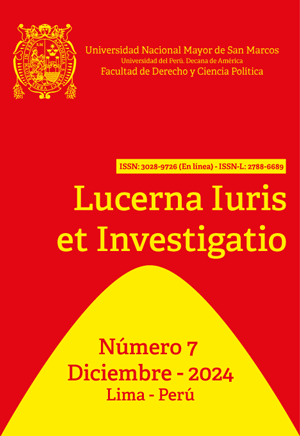Innocent or guilty? Scope of the paradoxic relationship between the presumption of innocence and preventive prison
DOI:
https://doi.org/10.15381/lucerna.n7.29328Keywords:
Preventive Prison, Court Resolutions, Presumption of Innocence, Preventive Prison Budgets, Principle of Criminal ProportionalityAbstract
The objective of this research article is to analyze to what extent the Preventive Prison mandates could go beyond the limits of the investigation represented by the institution of the Principle of the Presumption of Innocence of the investigated person, to whom this measure is imposed. For this, a literature review is carried out in the databases of Scielo and Alicia; finding a population of 33 research papers and articles of which, after applying the inclusion and exclusion criteria, 23 are selected (between theses and articles themselves), which are analyzed. And they allow arriving at the worrying result of the scant consideration, treatment and analysis of the Principle of Presumption of Innocence of the investigated in the Judicial Resolutions that impose Preventive Prison within a process, thus leaving him exposed to the disproportionate and excessive application of coercive measures in against it and thus violating other principles recognized not only by the criminal procedural norm, but also protected by the Political Constitution of Peru, failing to comply with the requirements required for the imposition of this exceptional measure.
Downloads
Published
Issue
Section
License
Copyright (c) 2024 Pamela Giulianna Pérez Raymundo

This work is licensed under a Creative Commons Attribution 4.0 International License.
THE AUTHORS RETAIN THEIR RIGHTS:
- The authors retain their rights to the work, trademark and patent, and also to any process or procedure described in the article.
- The authors retain the right to share, copy, distribute, execute and publicly communicate the article published in Lucerna Iuris et Investigatio (for example, place it in an institutional repository or publish it in a book), with an acknowledgment of its initial publication in Lucerna Iuris et Investigatio .
- The authors retain the right to make a subsequent publication of their work, to use the article or any part of it (for example: a compilation of their work, conference notes, thesis, or part of a book), provided that indicate the source of publication (authors of the work, journal, volume, number and date).






